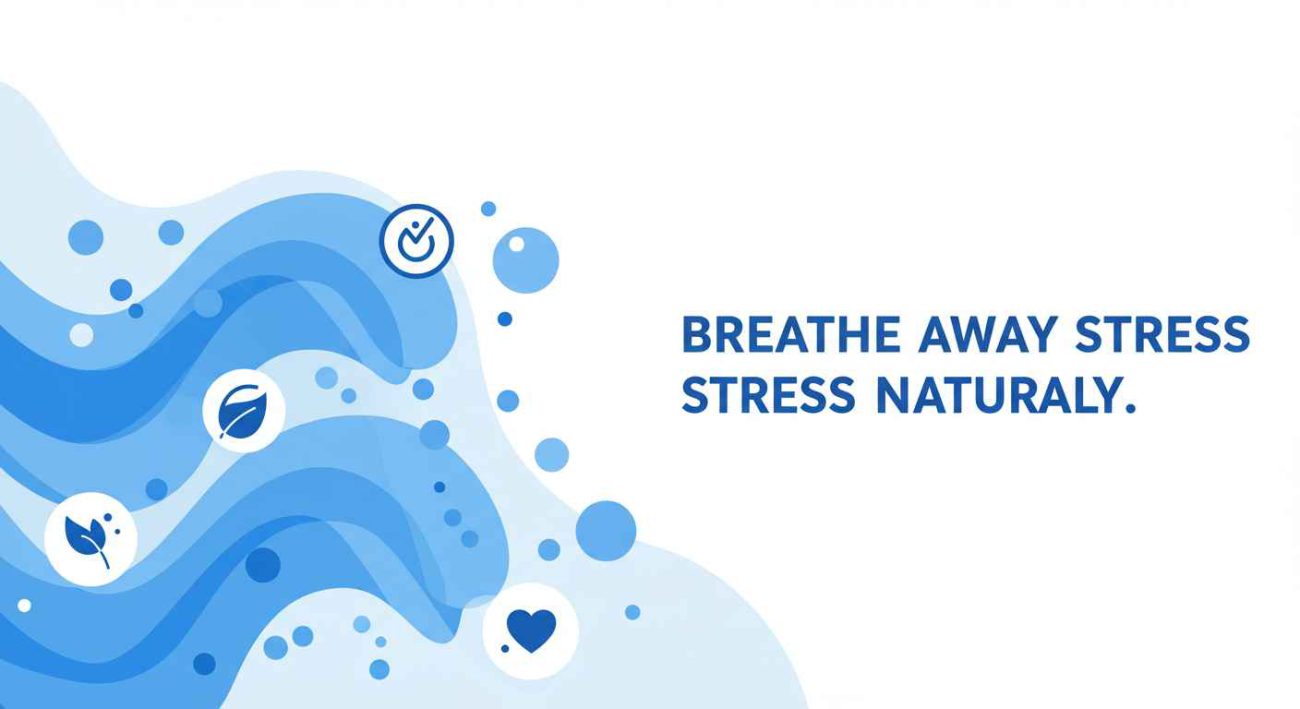You have just finished a day that seemed determined to outpace you, your thoughts still racing with a tide of emails, looming deadlines, and that persistent “what if” replay. When you finally close the door behind you, your shoulders feel like they are bracing against invisible weights, and the familiar comforts of home, maybe a Favorite show or a quiet cup of tea, struggle to lift the thick haze. Recognizable? Stress, in our hyper-connected lives, often arrives like a shadow guest you never invited, infiltrating your sleep, your interactions, and your body.
Yet the bright side of this truth is that you can, with simple, achievable practices, turn down the volume of that uninvited guest and invite a calmer version of yourself to stay. The reason this matter is straightforward: unrelenting stress can siphon away your energy and your joy. When you choose everyday, nature-based tools, you can soothe that drain, clear your mind, and feel genuinely in command of your own days. In the pages ahead, you will find straightforward, research-grounded strategies to ease stress without the fuss of complicated regimens. Treat this as a down-to-earth companion for threading moments of quiet through your routine. If you are ready to feel a little lighter and a lot steadier, let’s step forward together, one small and hopeful action at a time.
Activate Wellness through Movement
Consider how a brief walk outdoors seems to wipe the slate clean of nagging worries, like a mental refreshing. This affordable strategy, grounded in laboratory evidence, relies on the body’s release of endorphins, the analgesic neurotransmitters acting as potent mood enhancers. A dynamically chosen activity, perhaps an elevation-paced run, a flows-observant yoga series, or the joyful spontaneity of living-room dance, reduces the hypersecretion of cortisol, the body’s primary stress hormone, promotes a more constructive sleep architecture, and fortifies general adaptive capacity.
For the recently sedentary, the prescription is deliberately modest: 150 minutes of moderate-intensity exercise spread across each seven-day cycle, as the Centres for Disease Control and Prevention recommend. The strategic asset is the spectrum of activity options: a weekend traverse on trails, followed by a recovering bicycle roll in the evening twilight. The immediate consequences are lower basal tension and sharper cognitive clarity, translating into decisions grounded in composure. Envision the counterintuitive reward of concluding each workday with a sensation of earnest Vigor rather than depletion; that future state is the accessible, empirically grounded return on the investment of habit.
Nourishing Your Body Through a Balanced Diet
Imagine that a quieter mind depends more on the pantry than the therapist’s office. Whole, nutrient-dense foods help keep blood sugar steady and provide magnesium, B vitamins, and other micronutrients that settle the nervous system and stabilize mood. Processed, sugar-laden snacks, on the other hand, deliver quick energy and then leave anxiety to catch up. By choosing leafy greens, avocados, berries, beans, and fatty fish instead, you invite steady energy and clear thinking.
Research increasingly ties abundant vegetables and fruits to lower levels of self-reported stress. There’s no need for an elaborate program: trading an afternoon candy bar for a small handful of walnuts or tossing a handful of kale into a Favorite smoothie will do. This practice isn’t about punishing limits but about equipping the body to absorb life’s surprises without fraying edges, which in turn reduces the amplitude of mood shifts and prolongs calm satisfaction. You will notice greater steadiness in concentration, greater room for patience, and the translation of small tensions into small, solvable moments.
Prioritize Restful Sleep
Recall a morning after a fitful night when everything felt disproportionately heavy. That fog is not accidental; restorative sleep is our brain’s nightly reset button for emotion and energy. Most adults function best on seven to nine hours; when we settle for less, cortisol crests, clarity dims, and even minor stressors loom large.
Establish a pre-sleep ritual: lower the lights, set screens aside, and sip chamomile for its gentle sedative nature. This simple practice dissolves the day’s buildup and sharpens next-day judgment and mood. Imagine waking to a clear-eyed, hopeful you; consistent sleep turns that dream into a morning routine, helping you meet daily challenges with steadiness and perspective.
Practice Deep Breathing Techniques
Picture facing a wave of pressure and, instead of tensing, releasing a smooth, even breath. Deep, conscious inhalation slows the heart and activates the body’s built-in calms, letting you feel the storm outside without letting it pull you under. Regular practice turns this momentary breakthrough into a long-term shield, lowering anxiety spikes now and building greater resilience for the road ahead.
Try the 4-7-8 method: Inhale for four counts, hold for seven, exhale for eight. This concise practice, grounded in diaphragmatic breathing, helps lower blood pressure and dissolve muscle tension. Slip it into a busy commute or prior to the conference room, and you’ll trade tightness for clarity. Expect sharper attention, diminished reactivity, and a calm steadiness that invites greater confidence. Knowing this method resides in your pocket, ready to turn overwhelm into composure, feels both empowering and reassuring.
Cultivate Mindfulness and Meditation
How often do you notice your thoughts darting ahead and igniting stress? Mindfulness and meditation train the mind to remain in the moment, quieting inner noise and nurturing calm. Even micro-sessions gently remodel the brain, gradually softening anxiety symptoms.
Start with just five minutes each morning, drawing on guided apps to anchor attention in breath or space. You’ll notice a quieter mind and steadier emotions, translating into wiser decisions when pressure mounts. The practice resembles tending a private refuge: stress loses influence, and creativity and joy take root. Gradually, you’ll encounter life’s swings with composure and deeper connection to what truly matters.
Cultivate Regular Engagement with Nature
Have you noticed a drop in tension the moment you step into a leafy space or feel a breeze? Nature serves as an innate de-stressed; research indicates that a mere ten minutes in greenery can elevate mood and lower cortisol levels. Such experiences offer a quiet reminder that we are woven into a larger web, gently dissipating cognitive fog.
Turn the moment into a practice: Choose a park path, a community garden, or a chair by a window with a verdant view. Regular exposure strengthens psychological resilience, enhances concentration, and ignites creative thought. The benefits ripple outward, manifesting as lowered muscle tightness, improved sleep cycles, and an enduring sense of curiosity that lightens life’s routine. Treat the experience as a no-cost, open-access resource, consciously inserting bits of natural space into daily life as scheduled pauses for renewal.
Cultivate Supportive Relationships
When daily demands pile up, do you instinctively text a friend or retreat inward? Investing in deep, sustaining relationships creates a psychological buffer against the corrosion of stress. Talking openly about challenges triggers oxytocin release, which counters cortisol and fosters a sense of reassurance. Keep in mind that it is depth, not breadth, that counts; a single honest exchange can drastically reshape your feeling of isolation into belonging.
Invite a friend to grab a coffee or become a member of a community organization; even a quick video chat keeps the bond strong. Regular contact nourishes your emotional well-being, sharpening your judgment and brightening your perspective. Picture the comfort of a shared smile or a sympathetic listener, both dissolve loneliness and energize your effort to face upcoming hurdles. Relationships are not mere luxuries; they are instinctive sources of warmth and resilience that ground and uplift daily life.
Weave Journaling into Each Day
Suppose that a few minutes of writing could loosen the knots of anxiety. Journaling creates a private space to explore feelings, transforming murky worries into structured understanding. It highlights repeated themes and encourages appreciation, moving your attention from obstacles to opportunities.
Reserve ten minutes each evening to record whatever comes to mind or to list three moments of gratitude. This routine eases mental tension, enhances overall health, and lays the foundation for sounder sleep and wiser choices. The effect is liberating, like clearing clutter from a desk and leaving room for clear plans. Gradually, you will react less impulsively and gain a steadier view of your inner self, making pressure feel lighter and life feel richer.
Lowering stress in your daily life doesn’t require following someone else’s strict regimen; it’s a crafted journey only you can chart, and what feels right may shift with each season. We have already considered gentle movement, mindful meals, and quiet time in nature; each shining a different light on calm, clarity, and delight. All encourage you to build steady inner strength rather than chasing quick relief, allowing you to modify each practice until it feels at home within your routine. This week, choose one or two to welcome into your days. Approach the experiments with openness, notice how your body responds, and honor every small success. You are more than capable; may you steadily uncover your own rhythm of ease and brighten each moment you live.

